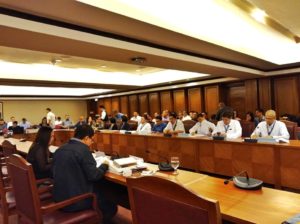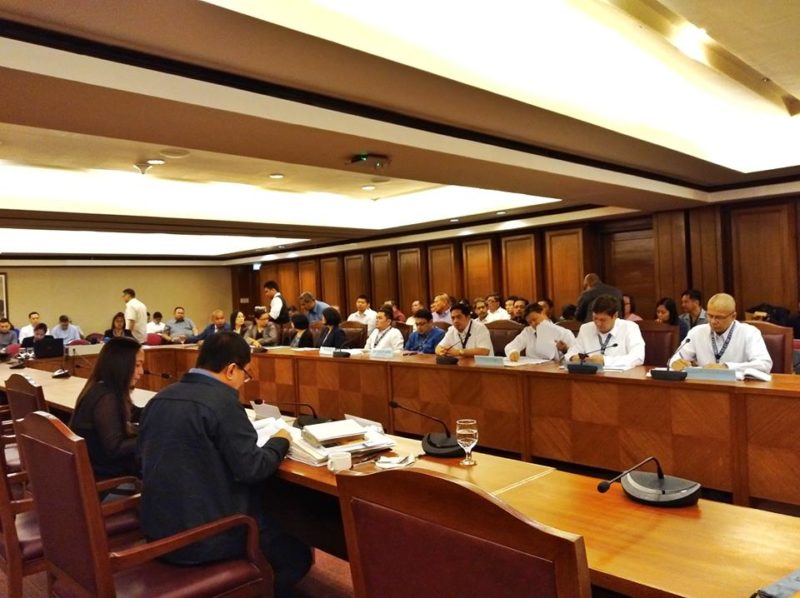
More Philippine stakeholders and port users are urgently pressing government to review and regulate charges imposed by international shipping lines, saying these charges have long been questionable and affect the country’s economy.
Philippine Multimodal Transportation and Logistics Association, Inc. (PMTLAI) president Marilyn Alberto, in a presentation at a Lower House Ways and Means Committee hearing on March 14, said government should take an urgent approach over the isue, “putting shipping line charges (under) scrutiny and to put necessary regulations to protect the interest of the public and the economy.”
Alberto noted such regulation is present in the air cargo transportation sector, where foreign air carriers are overseen by the Philippine Civil Aeronautics Board (CAB). Before imposing additional fees and surcharges, she said air carriers need to first apply with the CAB which then calls for a public consultation.
She added that in the United States, the Federal Maritime Commission regulates rates, charges, classifications, rules, and regulations contained in tariffs of foreign carriers controlled by foreign governments and operating in U.S. trades to ensure charges are just and reasonable.
Alberto said transport-related costs imposed by foreign shipping lines include ocean freight cost, currency adjustment factor, bunker adjustment factor, and container imbalance charge (CIC, also known as equipment management import or equipment positioning service).
PMTLAI also questioned fees imposed that are related to ships’ arrival at the terminal, such as the terminal handling charge (ranging from US$130 to $165 per twenty-foot equivalent unit [TEU]).
Alberto said the payment of terminal handling services performed by terminal operators is given to the port operator as arrastre, and yet shipping lines on their own also collect a terminal handling charge.
She said this means importers and exporters are paying for the same service twice.
The group also questioned why the terminal handling charge varies depending on cargo origin (P6,150 per TEU for those originating in ASEAN countries; $165 per TEU for U.S. and Europe origins).
“There is no rationale to the disparity of charges since containers are arriving at the same port; same services are rendered by the same operator,” Alberto pointed out.
Other container handling-related costs include container deposit (P5,000-P15,000 /TEU), container cleaning ($10-$20/TEU); container insurance fee (P30 per container), container detention and demurrage (shipping lines’ tariff), container repair (determined by shipping lines), and documentation (payable to outside container yard operator contracted by the shipping line).
Administration related costs, on the other hand, include documentation fee or bill of lading (B/L) fee ($50-$65 per B/L), and import release fee (P200-P300 per B/L).
“The industry cannot effectively and properly use its resources due to the container deposit scheme of the shipping lines,” Alberto said.
P60m in container deposits
Alberto said there are around 6,000 containers released daily at the ports of Manila. With an average container deposit of P10,000 per container a day, this means foreign liners collect P60 million in container deposits daily, or P1.2 billion for 20 days in a month.
She said container deposits are refunded by shipping lines on average three months after the empty containers have been returned to their designated depot.
Aside from container deposits, Alberto claimed shipping lines impose other layers of security measures on containers by requiring importers to sign a container guaranty jointly with their customs brokers, and by collecting a container insurance fee.
Alberto said PMTLAI is also questioning the emergency cost recovery surcharge (ECRS), which she noted has no clear definition and which used to be called “port congestion surcharge” during the 2014 Manila port congestion. But even after the congestion eased in 2015, Alberto said the ECRS is still being imposed but under a different name.
She also questioned why container yards remain congested even when importers already pay the CIC.
As explained by shipping lines, CIC is the cost of repositioning empty containers that were not utilized for exports, the result of a trade imbalance in the Philippines where imports exceed exports.
In addition, Alberto said there is no clear policy on the container cleaning fee, which oftentimes has already been paid to the shipping line, but the carrier’s appointed container yard operator still charges truckers the same fee.
Meanwhile, Alberto said the docs fee—an administrative cost for issuing a B/L—is being collected by the shipping line at origin, even as its agent in the Philippines collects a separate docs fee.
“The liberty of the shipping lines in imposing destination charges [is] without restrictions by laws and can easily be imposed, dictated and manipulated. If left unchecked and regulated, it can cause stagnancy in economic growth of the country and loss of competitiveness of Philippine products through restrictive cost of trade,” Alberto said.
She clarified the group is not questioning how much foreign carriers are charging “because that is their commercial decision.”
She said their group suggests that foreign carriers impose destination charges that are fully understandable and incurred in the Philippines only and not at the port of origin.
Lower House Deputy Speaker Sharon Garin, during the hearing, said the Customs Modernization and Tariff Act (CMTA) provides for the Bureau of Customs (BOC) to have supervision over logistics service providers, including shipping lines. She noted that this provision was a proposal of BOC during the drafting of the CMTA bill so that the bureau could “control what is happening around.”
Section 1226 of the CMTA states that “third parties transacting with the Bureau on behalf of importers and consignees shall be treated equally as true importers or consignees.”
Third parties, under the law, include logistics providers, carriers, airlines, shipping lines, shipping agents, forwarders, consolidators, port and terminal operators, and warehouse operators, “if such persons or entities transacted with the Bureau.”
BOC had issued last year draft implementing rules and regulations, in the form or a draft customs administrative order (CAO), to implement this section.
Atty. Florante Macarilay, head of the drafting team for the CAO that covers third parties dealing with BOC, said they have conducted a series of consultations with stakeholders regarding the registration of shipping lines with the customs bureau.
He noted it was also discussed whether BOC has jurisdiction over shipping lines, but in the end there was agreement to let market forces dictate charges.
Ways and Means Committee chair Dakila Carlo Cua, during the hearing, acknowledged it is “very dangerous for the government to dip its fingers in commercial matters” such as charges.
He suggested that the committee “look deeper into the matter”.
Association of International Shipping Lines (AISL) president Patrick Ronas, during the hearing, said no government agency has jurisdiction over operations of international shipping lines.
Atty. Hector Miole, Jr., of the Philippine Ports Authority (PPA) Legal Services Department, said the port authority’s mandate only covers the construction, operations, development, and maintenance of ports in the country.
Maritime Industry Authority (Marina), meanwhile, only has jurisdiction over domestic maritime enterprises and individuals.
Foreign lines cite consequences
Ronas, in an interview with PortCalls after the hearing, said that if the government starts regulating foreign carriers, some foreign shipping lines might find the regulations “unacceptable” and decide to “go somewhere else” to call and do business.
If this happens, Ronas said, the number of carriers will become limited and may cause freight rates to go up.
Earlier, AISL general manager Atty. Maximino Cruz told PortCalls in an interview that the government can impose some sort of regulation on local charges such as container deposit. However, charges such as freight and other surcharges cannot be regulated.
Cruz also pointed out that shipping lines cannot have uniform rates because “these (AISL) member lines are all competitors.” He added this may also be “in transgression of the competition law”.
The Ways and Means Committee has asked participants of the March 14 hearing to submit their position papers, and said another hearing will be called on the issue.
Earlier, the Port Users Confederation also proposed the review and discontinuation of several charges and fees allegedly imposed by agents of international shipping lines calling the Philippines, claiming these costs were “unjust” and “oppressive.” – Text and photo by Roumina Pablo





